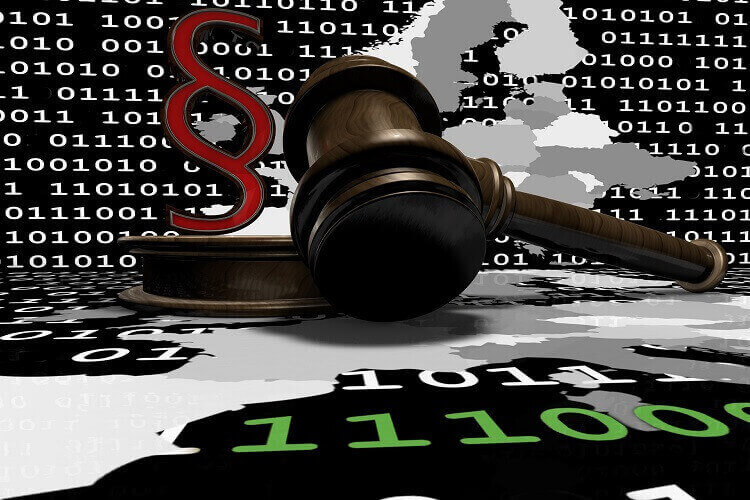The right to be forgotten only applies within the EU
The right to be “forgotten” has existed for more than five years, and does not mean that everything that has been uploaded to a person at some point in the future will remain on the internet for ever and ever and can be found there. Because that can sometimes cause problems when, for example, grad in the application phase for a new job, and the new potential employer first looks what the net as the “new employee” spits out.
The practice of resumes and thus possibly periods of life that are not conducive to a new position being scoured by companies and institutions in the internet is quite common and rather the rule than the exception. Therefore, the right to be forgotten is an important point in protecting personal information. But this right applies only within the EU, and not worldwide.
The right to be forgotten only applies within the EU
The right to be “forgotten” has existed for more than five years, and does not mean that everything that has been uploaded to a person at some point in the future will remain on the internet for ever and ever and can be found there. Because that can sometimes cause problems when, for example, grad in the application phase for a new job, and the new potential employer first looks what the net as the “new employee” spits out.
The practice of resumes and thus possibly periods of life that are not conducive to a new position being scoured by companies and institutions in the internet is quite common and rather the rule than the exception. Therefore, the right to be forgotten is an important point in protecting personal information. But this right applies only within the EU, and not worldwide.
Google does not have to delete search results worldwide
Since the existence of the internet forgetting scheme in 2014, over 850,000 applications have been received by Google for deletion of links. According to Google, 45 percent of the offending entries were removed from the search result lists.
Article 17 of the GDPR, which has been in force since 25.05.2018, stipulates the right to delete personal data by law. However, this (like many other) regulations is a bit spongy, so there is no explicit right to be forgotten. Because if this were implemented consistently then it would also apply worldwide, to which the information is really no longer to be found.
European law, which applies to the states of the EU, has no legally binding effect in other countries. Therefore, Google is not obliged to delete any objectionable links worldwide. This decision was confirmed on 24.09.2019 by the European Court of Justice on the basis of an application of an EU citizen for cancellation.
Although EU law does not require worldwide deletion, it does not prohibit it. This would allow the authorities of an EU Member State to force a worldwide erasure. It should be noted, however, that the personality right must be weighed against that of the public interest.
If, therefore, the public interest outweighs the individual interest of a person or organization, no deletion will take place in case of doubt. Incidentally, the decision to delete can take a long time, and in the case of a rejection of an application, the person concerned only has to go to court.
The Internet never forgets
We recommend the principle: “The Internet never forgets to follow”, and to think very well which information one reveals about itself on the Internet, and especially in social networks. Because even if you believe yourself to have images and other things effectively removed from the platform, you will never be sure if there is still somewhere a backup of the files.
By the way:
Even if results from the Google search result lists were deleted within the EU, but still available in other non-EU states, this hurdle can easily be leveraged via a VPN network. Because here it is easy to move your own location virtually to any country in the world. Take a look at the Google search results for one and the same search term with a changed country assignment.
More about other interesting topics around the protection of your data can be found here in our blog.
Google does not have to delete search results worldwide
Since the existence of the internet forgetting scheme in 2014, over 850,000 applications have been received by Google for deletion of links. According to Google, 45 percent of the offending entries were removed from the search result lists.
Article 17 of the GDPR, which has been in force since 25.05.2018, stipulates the right to delete personal data by law. However, this (like many other) regulations is a bit spongy, so there is no explicit right to be forgotten. Because if this were implemented consistently then it would also apply worldwide, to which the information is really no longer to be found.
European law, which applies to the states of the EU, has no legally binding effect in other countries. Therefore, Google is not obliged to delete any objectionable links worldwide. This decision was confirmed on 24.09.2019 by the European Court of Justice on the basis of an application of an EU citizen for cancellation.
Although EU law does not require worldwide deletion, it does not prohibit it. This would allow the authorities of an EU Member State to force a worldwide erasure. It should be noted, however, that the personality right must be weighed against that of the public interest.
If, therefore, the public interest outweighs the individual interest of a person or organization, no deletion will take place in case of doubt. Incidentally, the decision to delete can take a long time, and in the case of a rejection of an application, the person concerned only has to go to court.
The Internet never forgets
We recommend the principle: “The Internet never forgets to follow”, and to think very well which information one reveals about itself on the Internet, and especially in social networks. Because even if you believe yourself to have images and other things effectively removed from the platform, you will never be sure if there is still somewhere a backup of the files.
By the way:
Even if results from the Google search result lists were deleted within the EU, but still available in other non-EU states, this hurdle can easily be leveraged via a VPN network. Because here it is easy to move your own location virtually to any country in the world. Take a look at the Google search results for one and the same search term with a changed country assignment.
More about other interesting topics around the protection of your data can be found here in our blog.
Popular Posts:
Dynamic ranges in Excel: OFFSET function
The OFFSET function in Excel creates a flexible reference. Instead of fixing =SUM(B5:B7), the function finds the range itself, e.g., for the "last 3 months". Ideal for dynamic charts or dashboards that grow automatically.
Mastering the INDIRECT function in Excel
The INDIRECT function in Excel converts text into a real reference. Instead of manually typing =January!E10, use =INDIRECT(A2 & "!E10"), where A2 contains 'January'. This allows you to easily create dynamic summaries for multiple worksheets.
From assistant to agent: Microsoft’s Copilot
Copilot is growing up: Microsoft's AI is no longer an assistant, but a proactive agent. With "Vision," it sees your Windows desktop; in M365, it analyzes data as a "Researcher"; and in GitHub, it autonomously corrects code. The biggest update yet.
Windows 12: Where is it? The current status in October 2025
Everyone was waiting for Windows 12 in October 2025, but it didn't arrive. Instead, Microsoft is focusing on Windows 11 25H2 and "Copilot+ PC" features. We'll explain: Is Windows 12 canceled, postponed, or is it already available as an AI update for Windows 11?
Blocking websites on Windows using the hosts file
Want to block unwanted websites in Windows? You can do it without extra software using the hosts file. We'll show you how to edit the file as an administrator and redirect domains like example.de to 127.0.0.1. This will block them immediately in all browsers.
The “Zero Inbox” method with Outlook: How to permanently get your mailbox under control.
Caught red-handed? Your Outlook inbox has 1000+ emails? That's pure stress. Stop the email deluge with the "Zero Inbox" method. We'll show you how to clean up your inbox and regain control using Quick Steps and rules.
Popular Posts:
Dynamic ranges in Excel: OFFSET function
The OFFSET function in Excel creates a flexible reference. Instead of fixing =SUM(B5:B7), the function finds the range itself, e.g., for the "last 3 months". Ideal for dynamic charts or dashboards that grow automatically.
Mastering the INDIRECT function in Excel
The INDIRECT function in Excel converts text into a real reference. Instead of manually typing =January!E10, use =INDIRECT(A2 & "!E10"), where A2 contains 'January'. This allows you to easily create dynamic summaries for multiple worksheets.
From assistant to agent: Microsoft’s Copilot
Copilot is growing up: Microsoft's AI is no longer an assistant, but a proactive agent. With "Vision," it sees your Windows desktop; in M365, it analyzes data as a "Researcher"; and in GitHub, it autonomously corrects code. The biggest update yet.
Windows 12: Where is it? The current status in October 2025
Everyone was waiting for Windows 12 in October 2025, but it didn't arrive. Instead, Microsoft is focusing on Windows 11 25H2 and "Copilot+ PC" features. We'll explain: Is Windows 12 canceled, postponed, or is it already available as an AI update for Windows 11?
Blocking websites on Windows using the hosts file
Want to block unwanted websites in Windows? You can do it without extra software using the hosts file. We'll show you how to edit the file as an administrator and redirect domains like example.de to 127.0.0.1. This will block them immediately in all browsers.
The “Zero Inbox” method with Outlook: How to permanently get your mailbox under control.
Caught red-handed? Your Outlook inbox has 1000+ emails? That's pure stress. Stop the email deluge with the "Zero Inbox" method. We'll show you how to clean up your inbox and regain control using Quick Steps and rules.


































